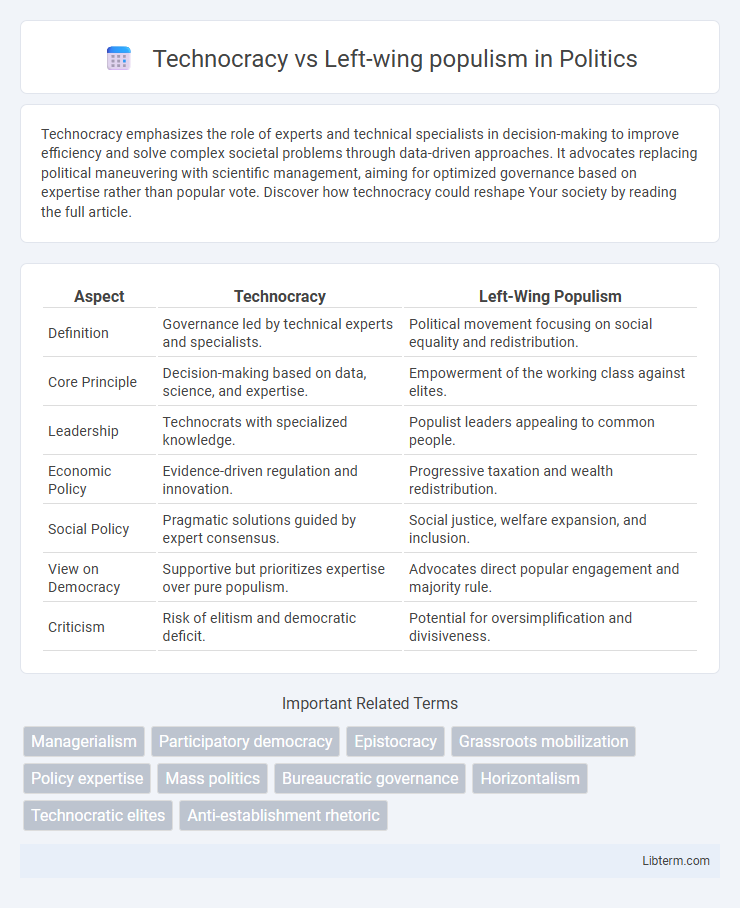Technocracy emphasizes the role of experts and technical specialists in decision-making to improve efficiency and solve complex societal problems through data-driven approaches. It advocates replacing political maneuvering with scientific management, aiming for optimized governance based on expertise rather than popular vote. Discover how technocracy could reshape Your society by reading the full article.
Table of Comparison
| Aspect | Technocracy | Left-Wing Populism |
|---|---|---|
| Definition | Governance led by technical experts and specialists. | Political movement focusing on social equality and redistribution. |
| Core Principle | Decision-making based on data, science, and expertise. | Empowerment of the working class against elites. |
| Leadership | Technocrats with specialized knowledge. | Populist leaders appealing to common people. |
| Economic Policy | Evidence-driven regulation and innovation. | Progressive taxation and wealth redistribution. |
| Social Policy | Pragmatic solutions guided by expert consensus. | Social justice, welfare expansion, and inclusion. |
| View on Democracy | Supportive but prioritizes expertise over pure populism. | Advocates direct popular engagement and majority rule. |
| Criticism | Risk of elitism and democratic deficit. | Potential for oversimplification and divisiveness. |
Understanding Technocracy: Definition and Core Principles
Technocracy is a system of governance where decision-making authority is vested in experts and technical specialists rather than elected politicians, emphasizing efficiency, data-driven policies, and scientific knowledge. Core principles include meritocracy, rational planning, and the prioritization of technological and economic expertise to solve complex societal issues. This contrasts with left-wing populism, which centers on mobilizing the masses through appeals to social justice, economic equality, and political empowerment of marginalized groups.
Left-Wing Populism Explained: Ideologies and Objectives
Left-wing populism advocates for economic equality, social justice, and redistribution of wealth through policies that challenge established elites and corporate power structures. It emphasizes grassroots participation, empowerment of marginalized groups, and reform of capitalist systems to address systemic inequality and promote public welfare. Key ideological components include anti-neoliberalism, social democracy, and progressive taxation aimed at reducing social disparities.
Historical Roots of Technocracy and Left-Wing Populism
Technocracy emerged in the early 20th century during the Progressive Era, advocating for governance by technical experts and engineers to solve social and economic problems through scientific management. Left-wing populism has its roots in 19th-century labor movements and agrarian revolts, emphasizing the empowerment of marginalized working-class communities against economic elites and corporate power. Both ideologies respond to societal inequalities but diverge in their approaches, with technocracy focusing on expertise-driven administration and left-wing populism stressing grassroots mobilization and social justice.
Governance Models: Expertise vs. Popular Participation
Technocracy emphasizes governance by experts and specialized knowledge, prioritizing data-driven decision-making and efficiency in public administration. Left-wing populism advocates for mass political participation, highlighting the importance of representing the working class and marginalized groups through democratic engagement. The tension between these models centers on whether policy legitimacy derives from technical competence or widespread popular support.
Economic Policies: Technocratic Efficiency vs. Populist Redistribution
Technocratic economic policies prioritize data-driven decision-making, fiscal discipline, and market efficiency to promote sustainable growth and innovation. Left-wing populism emphasizes wealth redistribution, social welfare expansion, and progressive taxation to address inequality and empower marginalized communities. These contrasting approaches reflect a tension between technocratic efficiency and populist demands for economic justice and inclusivity.
Representation: Elitism or Grassroots Empowerment?
Technocracy emphasizes decision-making by experts and specialists, often leading to elitist representation that prioritizes technical knowledge over popular will. Left-wing populism champions grassroots empowerment, involving ordinary people directly in political processes to challenge entrenched elites and promote social equity. The contrast lies in technocracy's top-down governance model versus left-wing populism's bottom-up approach to representation and political legitimacy.
Political Communication: Data-Driven Policy vs. Emotive Rhetoric
Technocracy emphasizes data-driven policy communication, relying on empirical evidence and expert analysis to shape public discourse and decision-making processes. Left-wing populism, in contrast, prioritizes emotive rhetoric, mobilizing mass sentiment by addressing social injustices and economic inequalities through relatable narratives and symbolic language. This divergence influences political engagement strategies, with technocracy aiming for rational consensus while left-wing populism seeks emotional solidarity.
Responses to Globalization and Social Inequality
Technocracy emphasizes expert-driven policy solutions to address globalization by promoting efficient economic management and technological innovation to reduce social inequality. Left-wing populism responds to globalization with demands for greater economic redistribution, protectionist measures, and expanded social welfare to support marginalized communities. Both perspectives critique the failures of neoliberal globalization but differ in their approaches: technocracy relies on data-driven reforms, while left-wing populism centers on grassroots mobilization and systemic change.
Contemporary Examples: Technocratic and Left-wing Populist Movements
Contemporary technocratic movements, such as Italy's Five Star Movement, emphasize expert-driven governance and policy rooted in data and scientific evidence to address economic and social challenges. In contrast, left-wing populist movements like Spain's Podemos mobilize grassroots support by advocating for wealth redistribution, social justice, and challenging established political elites. Both movements respond to economic inequality and political disenchantment but differ fundamentally in their approach to power and policy implementation.
Future Prospects: Coexistence or Political Conflict?
Technocracy and left-wing populism present distinct approaches to governance, where technocracy emphasizes expertise and data-driven policies, while left-wing populism prioritizes grassroots mobilization and social equity. Future prospects suggest a complex dynamic as technocratic governance may face resistance from populist movements demanding greater democratic participation and addressing economic inequalities. Political conflict is likely if technocratic elites ignore populist demands, but potential coexistence could emerge through hybrid models integrating expert knowledge with participatory, inclusive decision-making frameworks.
Technocracy Infographic

 libterm.com
libterm.com